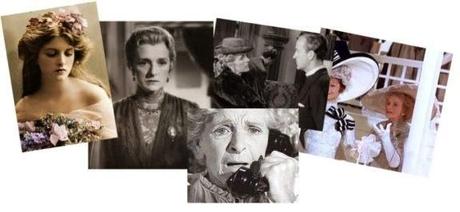
The What a Character! blogathon is in progress now, hosted by Once Upon a Screen, Outspoken and Freckled and Paula's Cinema Club. Click here for more information and links to participating blogs. My entry for the event follows...
~
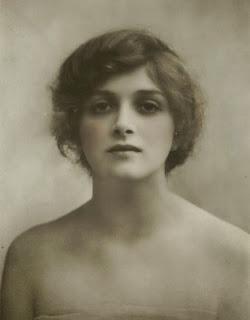
Young Gladys
She was a beautiful child, wide-eyed and wistful, who began modeling at age six; during World War I she was the favorite 'picture postcard' pin-up of British troops; she went on tour in a musical at age 17 and by the time she neared 40 she was a star of the London stage. In 1940, at age 51, she began working as a character actress in Hollywood and would, over the course of the next three decades, earn three Oscar nominations for Best Supporting Actress. Her name was Gladys Cooper and she is best remembered for her performance as Bette Davis's cruel, steel-willed mother, Mrs. Vale, in Now, Voyager...Gladys Cooper and Alfred Hitchcock launched their careers in Hollywood at the same time on the same film - Rebecca (1940). Cooper's was the small role of a tweedy aristocrat, the sister of Maxim de Winter (Laurence Olivier), who offered warmth and kindness to the beleaguered second Mrs. de Winter (Joan Fontaine). Rebecca, Selznick Pictures' follow up to Gone with the Wind, took the year's Best Picture Oscar and put Cooper (not to mention Hitchcock, Fontaine and Olivier) on the Hollywood map. Her obvious talent and commanding presence brought two less sympathetic roles next: Dennis Morgan's disapproving socialite mother in Kitty Foyle (1940) and the spurned wife of Laurence Olivier in That Hamilton
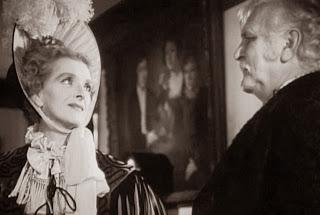
Gladys Cooper and Frank Morgan in Green Dolphin Street
Woman (1941). Her facility in these roles paved the way for Cooper to be cast as the villain in Now, Voyager. She earned her first Oscar nomination in 1942 for her portrayal of this archetypal devouring mother. The following year she earned her second nomination as Sister Marie Therese, a severe and punishing nun in The Song of Bernadette (1943).Typecast? Yes and no. Cooper was fortunate (and versatile) enough to cast in sympathetic roles - in Mr. Lucky (1943), The White Cliffs of Dover (1944), The Valley of Decision (1945), Green Dolphin Street (1947) and other popular films - but she was as often cast as uppercrust autocrats. In 1947, she brought one of her most memorable wealthy dowagers to the screen as Mrs. Hamilton in the holiday fantasy The Bishop's Wife. This time, though, there was a twist; the imperious widow's hardened heart was melted by no less an angel than Cary Grant - giving Cooper the rare chance to render both the harsh and tender facets of her character.
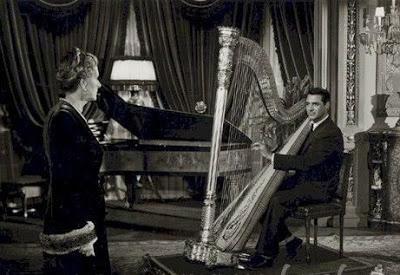
Gladys Cooper and Cary Grant, The Bishop's Wife (1947)
The 1950s brought the actress far more work on television that in films, but she would add one more notable ill-tempered and overbearing mother to her gallery of silver screen harridans. Maude Railton-Bell, her role in Delbert Mann's Separate Tables (1958), doesn't command the wealth or position of Mrs. Vale of the "Boston Vales," but she does maintain the same kind of suffocating stranglehold on her dowdy spinster daughter (Deborah Kerr).Gladys Cooper's credits during TV's early, golden days are impressive. She appeared on two legendary drama anthologies, The Alcoa Hour and Playhouse 90; she was featured on both Alfred Hitchcock Presents and The Alfred Hitchcock Hour; she guested on The Ann Sothern Show, Naked City, The Outer Limits, Burkes Law, Ben Casey, The Girl From U.N.C.L.E. (!) and was nominated for a
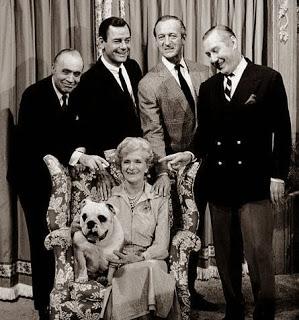
The Rogues
1964 primetime Emmy for The Rogues, a crime caper series in which she co-starred with Charles Boyer, David Niven, Gig Young and Robert Coote. Most often talked about among her many TV performances, though, are her appearances on the venerable series, The Twilight Zone. Cooper first appeared in a haunting 1962 episode entitled "Nothing in the Dark," in which she portrayed an elderly woman utterly terrified of death (personified by fledgling actor Robert Redford). Her second guest spot came the following year when she played one of several elderly travelers who have booked "Passage on the Lady Anne." Finally, later in 1963, came "Night Call," directed by Jacques Tourneur, in which she starred solo as an elderly woman who lives alone and begins to receive unnerving, anonymous phone calls.Now in her mid-70s, Gladys Cooper still had a last good film or two ahead of her. She was a member of John Huston's illustrious cast in The List of Adrian Messenger (1963) and earned her third and final Academy Award nomination for her performance as Mrs. Higgins, mother of Henry (Rex Harrison), in the Oscar-winning musical, My Fair Lady (1964).
And that's not all. Before she embarked on her Hollywood career, Cooper had starred on Broadway several times. She returned to the New York stage in her late career and earned Tony nominations in her final two roles. She was nominated for Best Actress in a Play in 1956 for her performance in The Chalk Garden and again in 1962 for her performance in A Passage to India (in a role that would bring an Oscar to Peggy Ashcroft 20+ years later).
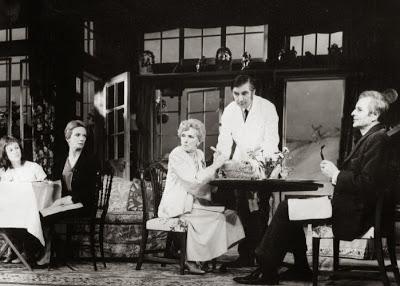
Gladys Cooper (center) in a 1971 revival of The Chalk Garden
At last, in 1967, as she approached her eighth decade, Gladys Cooper was named a Dame of the British Empire. Her life in the public eye had begun because of the great beauty with which she was naturally endowed; she was long considered the most beautiful woman in England. But Cooper was blessed with more than looks, she had striking talent and presence and was forever devoted to her craft. The blush of youthful beauty would, as it always does, fade, but her power as an actress only matured and deepened through the years. Dame Gladys Cooper had been about to embark on a Canadian tour with a revival of The Chalk Garden in 1971 when she was stricken with pneumonia and died. She was 82.
Bette Davis was set to tape a guest appearance on The Dick Cavett Show when she learned of Gladys Cooper's death; she shared her thoughts during the interview:

